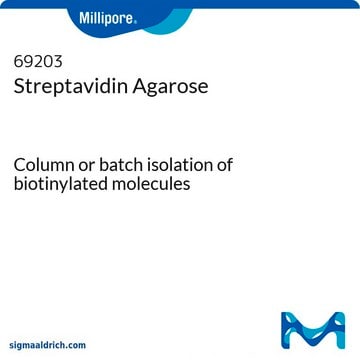B0519
Biotin−Agarose
PBS suspension
Synonym(s):
Vitamin H Agarose
About This Item
Recommended Products
form
PBS suspension
extent of labeling
≥30 mg avidin per mL packed resin
2-6 μmol per mL
matrix
4% beaded agarose
matrix activation
epoxy
matrix attachment
carboxy (amide linkage); resin remains relatively uncharged over wide pH range
matrix spacer
13 atoms
application(s)
life science and biopharma
storage temp.
2-8°C
Looking for similar products? Visit Product Comparison Guide
Application
Physical form
Storage Class Code
10 - Combustible liquids
WGK
WGK 3
Flash Point(F)
Not applicable
Flash Point(C)
Not applicable
Certificates of Analysis (COA)
Search for Certificates of Analysis (COA) by entering the products Lot/Batch Number. Lot and Batch Numbers can be found on a product’s label following the words ‘Lot’ or ‘Batch’.
Already Own This Product?
Find documentation for the products that you have recently purchased in the Document Library.
Customers Also Viewed
Related Content
Investigate in vitro protein-protein interactions with pull-down assays, utilizing affinity, GST pull-down, TAP, and co-immunoprecipitation methods.
Investigate in vitro protein-protein interactions with pull-down assays, utilizing affinity, GST pull-down, TAP, and co-immunoprecipitation methods.
Investigate in vitro protein-protein interactions with pull-down assays, utilizing affinity, GST pull-down, TAP, and co-immunoprecipitation methods.
Investigate in vitro protein-protein interactions with pull-down assays, utilizing affinity, GST pull-down, TAP, and co-immunoprecipitation methods.
Our team of scientists has experience in all areas of research including Life Science, Material Science, Chemical Synthesis, Chromatography, Analytical and many others.
Contact Technical Service











